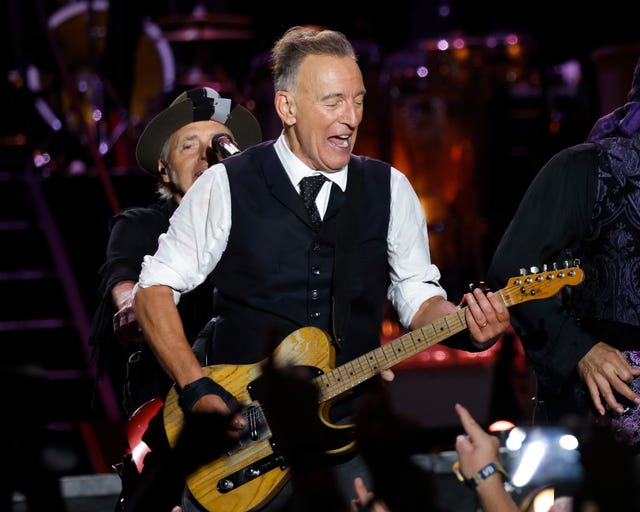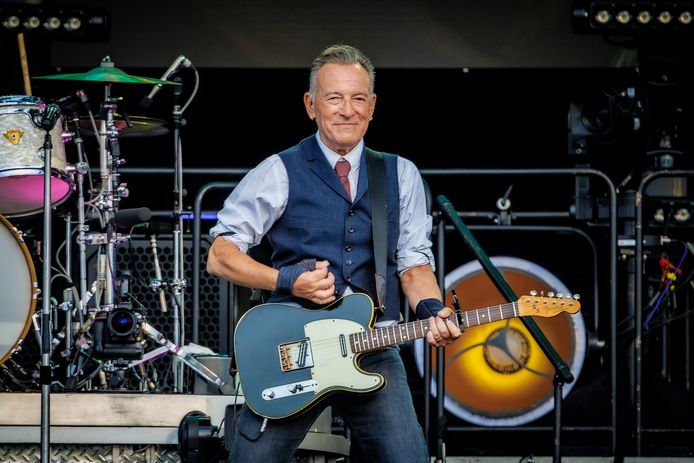On Wednesday night, Bruce Springsteen took the stage at Toronto’s Scotiabank Arena over an hour late with profuse apologies — there was plane trouble, apparently. He then declared, “This is a fighting prayer for my country,” and roared into an emphatic version of his 2007 song, “Long Walk Home,” following immediately with an enormous, majestic rendition of “Land of Hope and Dreams.”

It wasn’t the first time that Springsteen had introduced “Long Walk Home” — originally written about the George W. Bush years of disorientation and disillusionment — with a comment about it being a prayer for the United States. And it’s certainly not the first time that “Land of Hope and Dreams” has been invoked by Springsteen in moments of importance — he did so last week at rallies for Vice-President Kamala Harris’ presidential campaign in Atlanta and Philadelphia. These are big songs, full of meaning and symbolism, songs you close a set with. But on the night after the 2024 presidential election, you start here.
If an artist’s statements are defined by what they actually say — as opposed to what they sing — then sure, Springsteen didn’t say anything else about the election beyond his initial mention. In his recent documentary, “Road Diary,” Springsteen says that he played the same set every night during his 2023 summer tour — something he’s rarely done — because it was the story he wanted to tell. And if you look at the songs chosen for Wednesday night’s concert, and / or the intensity with which they were performed, he spoke volumes.

The one-two punch of “Darkness on the Edge of Town”’s “Candy’s Room” and “Adam Raised a Cain” have occupied the same space since 1978: tales of teenage lust and filial conflict, but they are also barnburners ideal for working out some anger and frustration via his battered vintage guitar. In “Cain,” Springsteen delivered the lines with a finely honed fury: “You remember the faces, the places, the names/ You know it’s never over, it’s relentless as the rain.” At its heart, the song is about betrayal. Springsteen can almost always deliver the song, even 46 years later, and make you believe it. But tonight he also made everyone feel it. “Darkness” is an angry album, and putting that energy up front made sense.
Songs from 2002’s “The Rising,” written in response to the attacks against the US on 9/11, also figured in the message. “Lonesome Day” has been a constant in the set since the start of this tour outing in 2023, but the lines “The joke’s on me, but it’s gonna be okay/ If I can just get through this lonesome day,” originally written in the voice of a surviving spouse or partner, had new meaning now. Similarly, “Waiting on a Sunny Day,” a song that originally offered a bit of semi-comic respite in the story being told on “The Rising,” made a rare appearance (he usually performs the song when it’s actually raining), playing the same role as it did on the record. Some in the audience may have found the same kind of comfort in the song tonight as it originally offered: “Don’t worry, we’re gonna find a way.”
Otherwise, in many ways Wednesday was a standard Bruce Springsteen and the E Street Band concert in 2024. The tour’s established themes of life and aging and mortality, as discussed in “Road Diary,” were still present, with newer songs from 2022’s “Letter to You” mixed with material from the entirety of his career, going back as far as 1973 for “The E Street Shuffle” and its horn arrangements and jazz-influenced rhythms. A reworked “Reason to Believe” from “Nebraska” became a roadhouse blues, complete with audience call-and-response. “Darkness on the Edge of Town” — another song that Springsteen loaned to the Harris campaign — was dark and raw and thanks to piano player Roy Bittan. But when Springsteen lingered on the last chorus, you could feel the anguish.

There were two audibles, special requests that weren’t on the setlist. Earlier in the set, a couple with a sign explaining that this was 25 years “to the day??” that they either met or got married rated them a fairly rare performance of “Better Days,” from 1992’s “Lucky Town”: “Better days with a woman like you,” the chorus goes. Later in the evening, Springsteen stepped to the front of the stage clearly looking for something in the audience. Someone handed up a Santa hat, Bruce Springsteen put it on his head, and he cued the band. Based on the initial ragged response, it seems that this had not been discussed in advance, but the E Street Band got it together and thus Toronto was treated to an early “Santa Claus is Coming to Town,” although it was not the earliest of this year: that honor went to a particularly rain-drenched crowd in Cork, Ireland in May.)
The show’s strangest moments took place early in the evening, during “Hungry Heart.” As Springsteen worked his way around the stage, from side to side, with the house lights up, a commotion began in the seats on stage left: Phones came out audience members pointed at someone who seemed to be a celebrity, standing near the edge of the stage. That celebrity turned out to be former New Jersey Governor Chris Christie, a die-hard fan who has had a complicated history with the Boss (and an even more tumultuous one with the once and future President Trump, which had taken another turn when Christie published an op-ed in a Canadian journal about how the new administration could be good for Canada). His presence was never acknowledged by anyone onstage and he was gone shortly thereafter, but given Christie’s political affiliation, Springsteen’s explicit endorsements of Kamala Harris, and the show’s opening numbers directed at the results of the 2024 presidential race, it was definitely oddly timed.

But there were also plenty of smaller, sweeter, sillier moments, whether the well-honed dance moves — Bruce and Steve Van Zandt had some spiffy new ones during “Glory Days” — or the rolling parade of hit after hit that is the E Street encore. There was even a delightful public trainwreck as the horns tried to play the James Brown-inspired riff that comes before the band introductions, and promptly failed not once but twice — before Van Zandt informed everyone onstage that the key was B flat. Springsteen cued them one more time, this time successfully.
“Last Man Standing,” from “Letter to You,” was prefaced by a story Springsteen has told every night in some fashion, about his first band and how he was the last living member. He tells that story and then Roy Bittan returns to the stage and strikes the intro chords to “Backstreets” as Springsteen picks up his battered guitar and holds it aloft, offering it to all four sides of the stage, deliberately. It’s a gesture that he’s done for years now; it’s a promise, a reminder and a weapon. At the song’s conclusion, Springsteen sang, “Until the end… until it ends.” It wasn’t a big change in the lyrics, but it was a change nonetheless. The audience roared in response.
